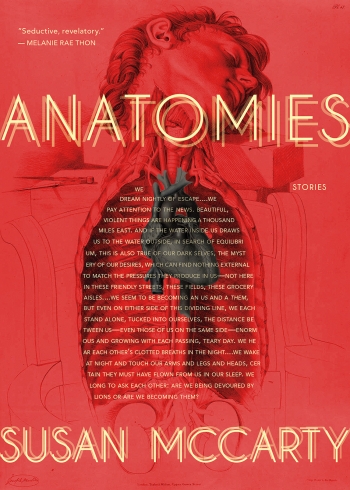Susan McCarty’s debut collection of stories, Anatomies, features tales that often hinge around our bodies, our desires, our needs. Even the cover features a body lying at rest, its chest cavity exposed, the kind one might find in ancient anatomy textbooks. Section divisions are punctuated with similar black and white illustrations. The book, itself a work of art, asks, “Where is the soul located?” The stories point back to ourselves, our hearts, our stomachs, and respond, “Everywhere.”
In addition to realistic stories—an SAT tutor who meets with a dead tutee’s family, a family going through divorce—we also get exhibits of McCarty’s bold experimentation. In one story, a couple’s dates are reported using only scientific facts about their bodies—their temperatures, their heartbeats, how their bodies are positioned. A section of flash fiction begins with a story from the point of view of small animals, showcasing how their bodies dictate their hunger and their need for warmth. Other stories explore less likely scenarios or exaggerated premises, including the aftermath of the zombie apocalypse. Attention to the body and the taxonomies of how we feed it ties these disparate tales together.
The most stunning pieces are those that inhabit their characters deeply. “Fellowship,” the story of a family falling apart after the parents’ divorce, focuses on the daughter’s coming of age and her relationship with a boy who has joined a cultish youth group, offering a surprising take on love and its needs. As her parents’ relationship fractures, she imagines a friend’s intact family, laughing “like the stars of their own sitcom, like they were on their own cloud up in heaven and had forgotten the rest of us, down here, in our weird, hungry bodies on earth.”
“Another Zombie Story” follows a couple trying to date after they’ve survived the zombie apocalypse, but its attention to food is what offers a different slant on what, after the advent of zombie media like The Walking Dead and The Road, might seem like over-explored territory. The real textures of the food the characters cook, attention to what they cannot stomach or desire after they’ve seen others eaten by zombies, what they find comforting and crave—this is a new and harrowing take because it comes so close to the small moments inside all our houses.
McCarty’s range means that no matter what your literary taste, you’ll find something to like in this collection. After you read it, living in your body will never feel quite the same.
Peynado, a Ph.D. candidate in creative writing at the University of Cincinnati, won the Chicago Tribune’s Nelson Algren Short Story Award in 2015.







We ask that those who engage in Wellesley magazine's online community act with honesty, integrity, and respect. (Remember the honor code, alums?) We reserve the right to remove comments by impersonators or comments that are not civil and relevant to the subject at hand. By posting here, you are permitting Wellesley magazine to edit and republish your comment in all media. Please remember that all posts are public.